2000 MERCEDES-BENZ SL500 oil temperature
[x] Cancel search: oil temperaturePage 5 of 297

2 Contents
Antiglare night position .............. 71
Exterior rear view mirrors .......... 72
Storing mirror positions in
memory .......................................... 73
Instrument cluster ........................... 74
Indicator lamps in the
instrument cluster ....................... 76
Additional function indicator
lamps .............................................. 77
Instrument lamps ......................... 77
Display illumination .................... 77
Coolant temperature gauge ........ 78
Outside temperature
indicator ........................................ 78
Trip odometer ............................... 79
Clock .............................................. 79
Tachometer .................................... 79
Flexible service system (FSS) ........ 80Engine oil level indicator in
odometer display field ............... 82
Fuel consumption gauge ................ 83
Engine oil temperature gauge ....... 83
Engine oil consumption ................. 83
Exterior lamp switch ....................... 84
Standing lamps ............................ 85
Night security illumination ....... 85
Combination switch ........................ 86
Blocked windshield wiper .......... 88
Windshield wiper smears .......... 88
Windshield and headlamp
washer fluid mixing ratio .......... 88
Hazard warning flasher switch ..... 89
Automatic climate control .............. 90
Display and controls ................... 92
Basic setting - automatic mode . 93
Economy ........................................ 93
Special settings ............................ 94Audio and telephone, operation .... 98
Power windows ................................116
Express opening of
door windows ...............................117
Synchronizing power
windows ........................................117
Roll bar .............................................118
Interior lighting ............................. 120
Interior lamps ............................. 120
Reading lamps ............................ 120
Entrance lamps in footwells,
exit lamps in doors .................... 120
Sunshade, manual ......................... 121
Power sunshade ............................. 122
Sun visors ....................................... 123
Illuminated vanity mirror ............ 123
Interior ............................................ 124
Page 31 of 297

27 Contents – Operation
Technical
data Instruments
and controlsOperationDrivingInstrument
cluster displayPractical hints Car care Index Trip odometer ............................... 79
Clock .............................................. 79
Tachometer .................................... 79
Flexible service system (FSS) ........ 80
Engine oil level indicator in
odometer display field ................ 82
Fuel consumption gauge ................. 83
Engine oil temperature gauge ........ 83
Engine oil consumption .................. 83
Exterior lamp switch ....................... 84
Standing lamps ............................. 85
Night security illumination ........ 85
Combination switch ........................ 86
Blocked windshield wiper .......... 88
Windshield wiper smears ........... 88
Windshield and headlamp
washer fluid mixing ratio ........... 88
Hazard warning flasher switch ..... 89
Automatic climate control .............. 90
Display and controls .................... 92
Basic setting - automatic mode .. 93
Economy ........................................ 93
Special settings ............................ 94Audio and telephone, operation .... 98
Power windows ............................... 116
Express opening of
door windows .............................. 117
Synchronizing power
windows ....................................... 117
Roll bar ............................................. 118
Interior lighting ............................. 120
Interior lamps ............................. 120
Reading lamps ............................ 120
Entrance lamps in footwells,
exit lamps in doors .................... 120
Sunshade, manual ..........................121
Power sunshade ............................. 122
Sun visors ....................................... 123
Illuminated vanity mirror ............ 123
Interior ............................................ 124
Storage compartment
(eyeglasses compartment)
in the dashboard ...................... 124
Interior central
locking system ........................... 125
Integration with vehicle
central locking system .............. 126Separate locking of storage
compartments ............................. 126
Armrest ........................................... 127
Console storage
compartments ............................ 127
Cup holder ...................................... 128
Parcel net in
passenger footwell .................... 128
Door pockets ................................... 129
Rear storage compartment ........... 129
Ashtray with lighter ...................... 130
Lighter ............................................. 131
Telephone, general ........................ 132
Garage door opener ....................... 133
Hardtop or panorama roof ............ 137
Removing hardtop ...................... 137
Attaching hardtop ...................... 140
Soft top ............................................ 143
Lowering soft top ........................ 144
Raising soft top ........................... 145
Wind screen .................................... 148
Antenna ........................................... 151
Page 79 of 297

75 Instrument cluster
Technical
data Instruments
and controlsOperationDrivingInstrument
cluster displayPractical hints Car care Index 1Fuel gauge with reserve and fuel cap placement
warning lamp (yellow), see page 207
2Coolant temperature gauge, see page 78
3Fuel consumption gauge, see page 83
4Engine oil temperature gauge, see page 83
5Left turn signal indicator lamp (green),
see combination switch on page 86
6K nob for intensity of instrum ent l amps, see pa ge 77,
for resetting trip odometer, see page 79 and
for calling up FSS indicator, see page 80
7Speedometer8EPS warning lamp (yellow), see page 207
9Odometer display field, see page 82
10Main/trip odometer, see page 79
or FSS indicator, see page 80
or engine oil level indicator, see page 82
11Outside temperature indicator, see page 78
12Right turn signal indicator lamp (green),
see combination switch on page 86
13Tachometer, see page 79
14Knob for setting clock, see page 79
15Clock, see page 79
Page 87 of 297
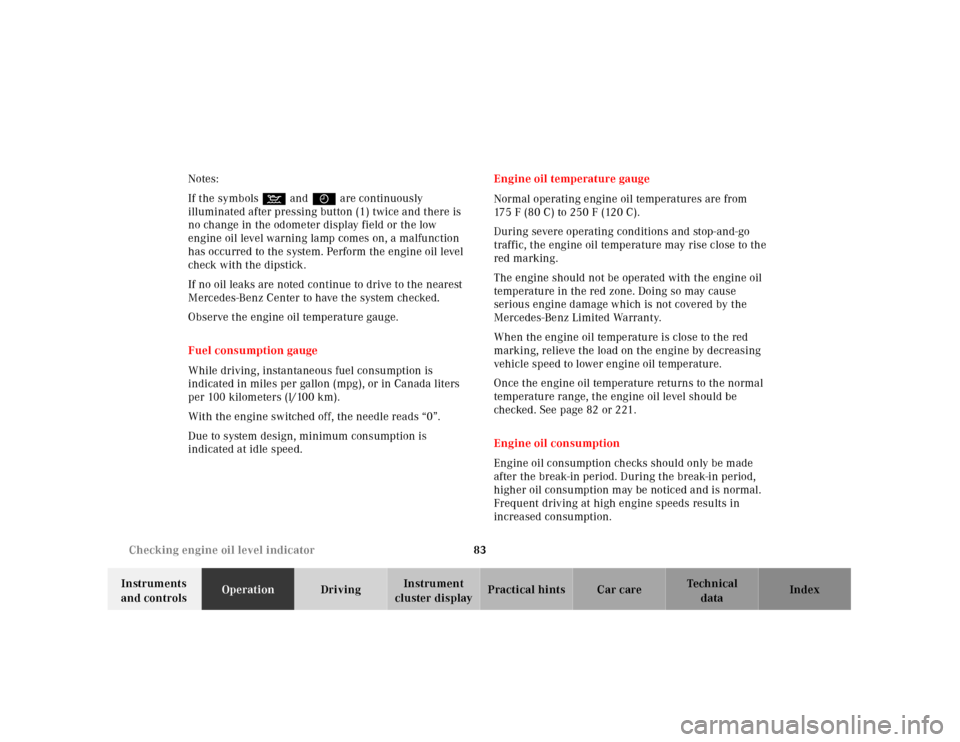
83 Checking engine oil level indicator
Technical
data Instruments
and controlsOperationDrivingInstrument
cluster displayPractical hints Car care Index Notes:
If the symbols : and I are continuously
illuminated after pressing button (1) twice and there is
no change in the odometer display field or the low
engine oil level warning lamp comes on, a malfunction
has occurred to the system. Perform the engine oil level
check with the dipstick.
If no oil leaks are noted continue to drive to the nearest
Mercedes-Benz Center to have the system checked.
Observe the engine oil temperature gauge.
Fuel consumption gauge
While driving, instantaneous fuel consumption is
indicated in miles per gallon (mpg), or in Canada liters
per 100 kilometers (l/100 km).
With the engine switched off, the needle reads “0”.
Due to system design, minimum consumption is
indicated at idle speed.Engine oil temperature gauge
Normal operating engine oil temperatures are from
175 F (80 C) to 250 F (120 C).
During severe operating conditions and stop-and-go
traffic, the engine oil temperature may rise close to the
red marking.
The engine should not be operated with the engine oil
temperature in the red zone. Doing so may cause
serious engine damage which is not covered by the
Mercedes-Benz Limited Warranty.
When the engine oil temperature is close to the red
marking, relieve the load on the engine by decreasing
vehicle speed to lower engine oil temperature.
Once the engine oil temperature returns to the normal
temperature range, the engine oil level should be
checked. See page 82 or 221.
Engine oil consumption
Engine oil consumption checks should only be made
after the break-in period. During the break-in period,
higher oil consumption may be noticed and is normal.
Frequent driving at high engine speeds results in
increased consumption.
Page 187 of 297
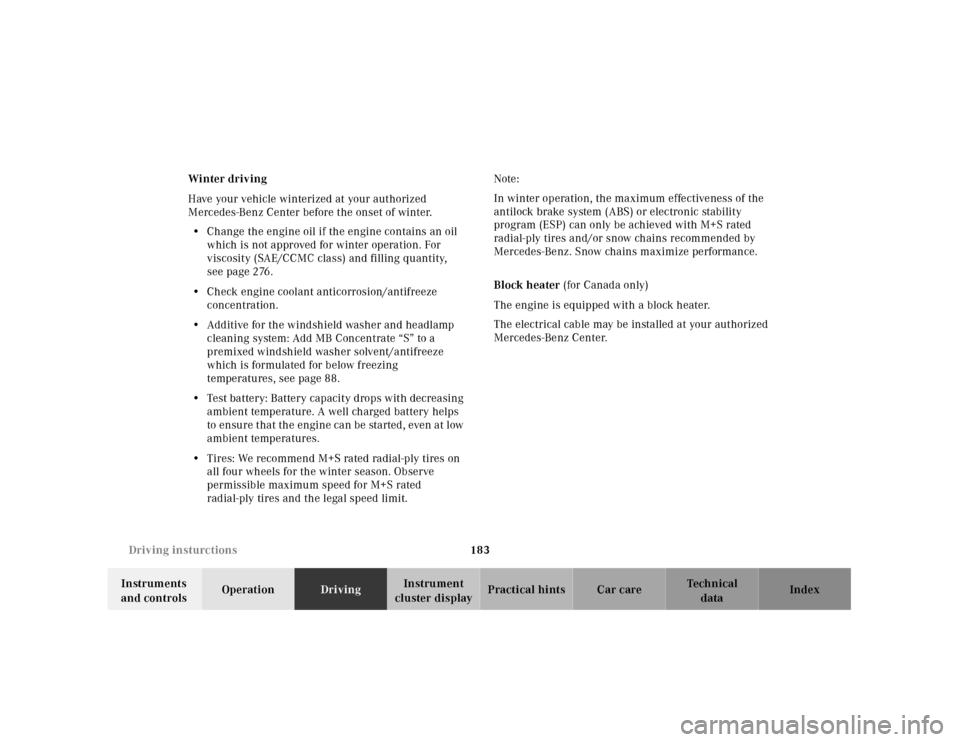
183 Driving insturctions
Technical
data Instruments
and controlsOperationDrivingInstrument
cluster displayPractical hints Car care Index Winter driving
Have your vehicle winterized at your authorized
Mercedes-Benz Center before the onset of winter.
• Change the engine oil if the engine contains an oil
which is not approved for winter operation. For
viscosity (SAE/CCMC class) and filling quantity,
see page 276.
• Check engine coolant anticorrosion/antifreeze
concentration.
• Additive for the windshield washer and headlamp
cleaning system: Add MB Concentrate “S” to a
premixed windshield washer solvent/antifreeze
which is formulated for below freezing
temperatures, see page 88.
• Test battery: Battery capacity drops with decreasing
ambient temperature. A well charged battery helps
to ensure that the engine can be started, even at low
ambient temperatures.
• Tires: We recommend M+S rated radial-ply tires on
all four wheels for the winter season. Observe
permissible maximum speed for M+S rated
radial-ply tires and the legal speed limit.Note:
In winter operation, the maximum effectiveness of the
antilock brake system (ABS) or electronic stability
program (ESP) can only be achieved with M+S rated
radial-ply tires and/or snow chains recommended by
Mercedes-Benz. Snow chains maximize performance.
Block heater (for Canada only)
The engine is equipped with a block heater.
The electrical cable may be installed at your authorized
Mercedes-Benz Center.
Page 214 of 297
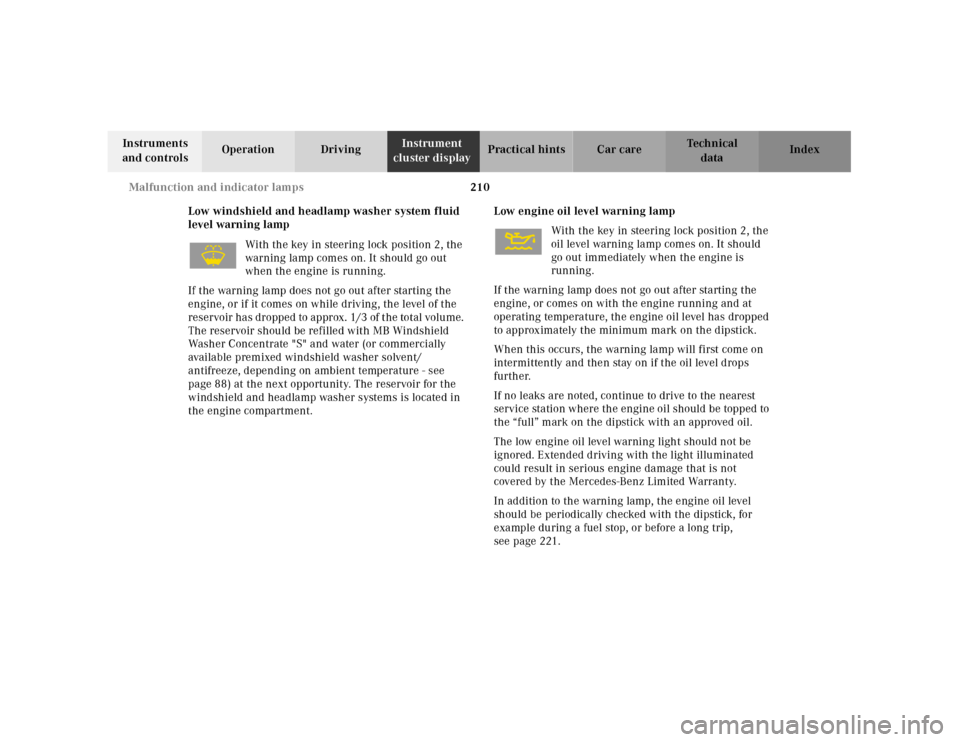
210 Malfunction and indicator lamps
Technical
data Instruments
and controlsOperation DrivingInstrument
cluster displayPractical hints Car care Index
Low windshield and headlamp washer system fluid
level warning lamp
With the key in steering lock position 2, the
warning lamp comes on. It should go out
when the engine is running.
If the warning lamp does not go out after starting the
engine, or if it comes on while driving, the level of the
reservoir has dropped to approx. 1/3 of the total volume.
The reservoir should be refilled with MB Windshield
Washer Concentrate "S" and water (or commercially
available premixed windshield washer solvent/
antifreeze, depending on ambient temperature - see
page 88) at the next opportunity. The reservoir for the
windshield and headlamp washer systems is located in
the engine compartment.Low engine oil level warning lamp
With the key in steering lock position 2, the
oil level warning lamp comes on. It should
go out immediately when the engine is
running.
If the warning lamp does not go out after starting the
engine, or comes on with the engine running and at
operating temperature, the engine oil level has dropped
to approximately the minimum mark on the dipstick.
When this occurs, the warning lamp will first come on
intermittently and then stay on if the oil level drops
further.
If no leaks are noted, continue to drive to the nearest
service station where the engine oil should be topped to
the “full” mark on the dipstick with an approved oil.
The low engine oil level warning light should not be
ignored. Extended driving with the light illuminated
could result in serious engine damage that is not
covered by the Mercedes-Benz Limited Warranty.
In addition to the warning lamp, the engine oil level
should be periodically checked with the dipstick, for
example during a fuel stop, or before a long trip,
see page 221.
Page 224 of 297
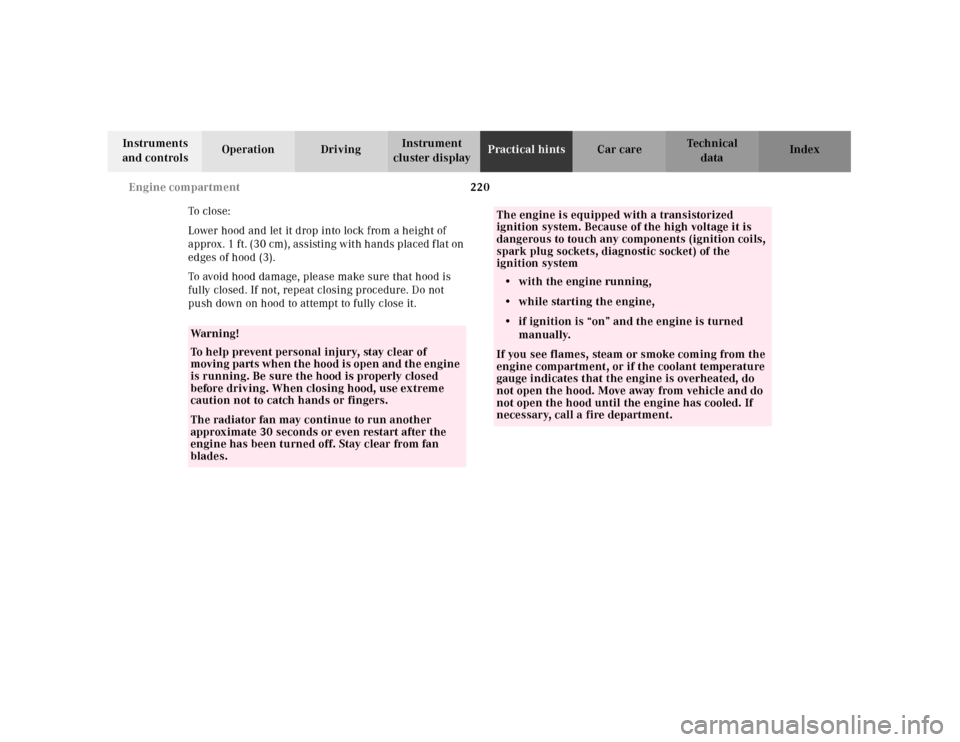
220 Engine compartment
Technical
data Instruments
and controlsOperation DrivingInstrument
cluster displayPractical hintsCar care Index
To cl os e:
Lower hood and let it drop into lock from a height of
a pprox. 1 f t. (30 cm), assisting w it h h ands pla ced f la t on
edges of hood (3).
To avoid hood damage, please make sure that hood is
fully closed. If not, repeat closing procedure. Do not
push down on hood to attempt to fully close it.
Wa r n i n g !
To help prevent personal injury, stay clear of
moving parts wh en t he hood is open and th e engine
is running. Be sure the hood is properly closed
before driving. When closing hood, use extreme
caution not to catch hands or fingers.The radiator fan may continue to run another
approximate 30 seconds or even restart after the
engine has been turned off. Stay clear from fan
blades.
The engine is equipped with a transistorized
ignition system. Because of the high voltage it is
dangerous to touch any components (ignition coils,
spark plug sockets, diagnostic socket) of the
ignition system
• with the engine running,
• while starting the engine,
• if ignition is “on” and the engine is turned
manually.If you see flames, steam or smoke coming from the
engine compartment, or if the coolant temperature
gauge indicates that the engine is overheated, do
not open the hood. Move away from vehicle and do
not open the hood until the engine has cooled. If
necessary, call a fire department.
Page 225 of 297
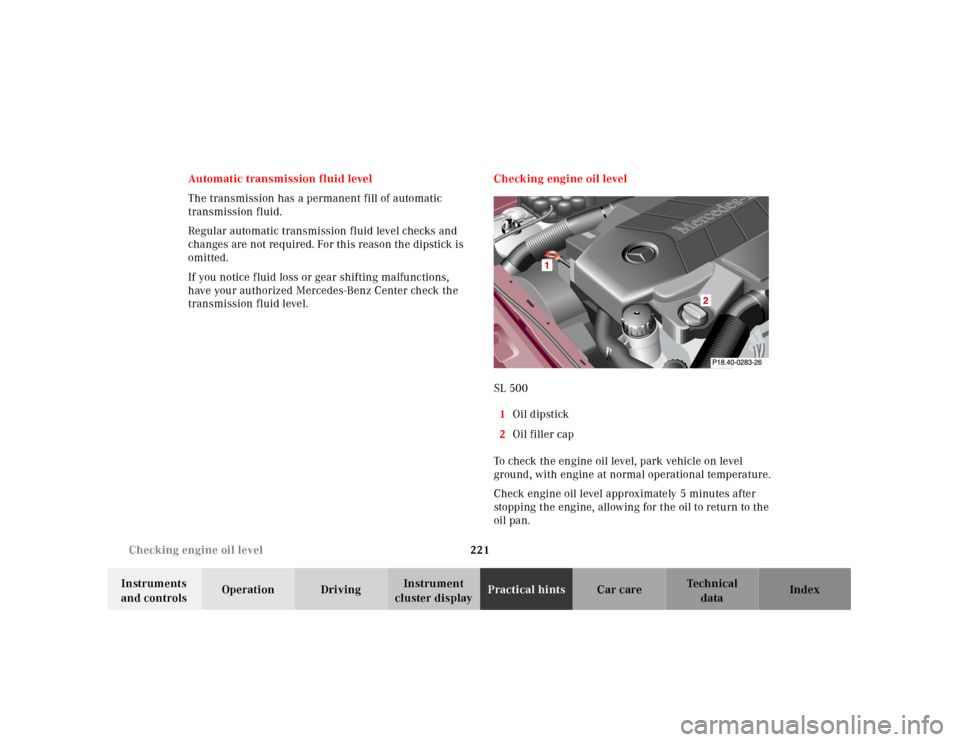
221 Checking engine oil level
Technical
data Instruments
and controlsOperation DrivingInstrument
cluster displayPractical hintsCar care Index Automatic transmission fluid level
The transmission has a permanent fill of automatic
transmission fluid.
Regular automatic transmission fluid level checks and
changes are not required. For this reason the dipstick is
omitted.
If you notice f luid loss or gear shifting malfunctions,
have your authorized Mercedes-Benz Center check the
transmission fluid level.Checking engine oil level
SL 500
1Oil dipstick
2Oil filler cap
To check the engine oil level, park vehicle on level
ground, with engine at normal operational temperature.
Check engine oil level approximately 5 minutes after
stopping the engine, allowing for the oil to return to the
oil pan.